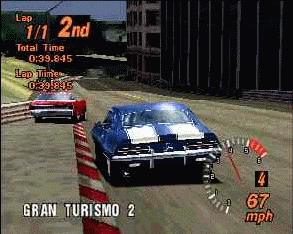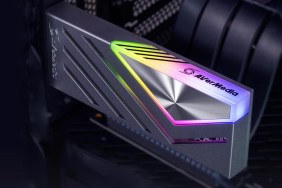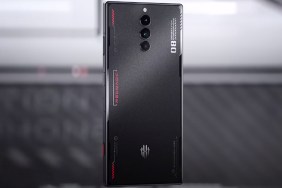If it ain’t broke, add to it.
All right – everyone who is a fan of Gran
Turismo, let go of your mice and raise your hands. I can’t see them… There,
that’s better. You are the ones who have been playing the game now synonymous
with racing perfection. You are the ones who have invested in extra memory cards
to save your high-performance vehicles and to record your thrilling digital races.
Perhaps you have even been temporarily lured away from your prize racer by the
allure of Need For Speed: High Stakes,
or R4: Ridge Racer. But no! You resisted
temptation, and have spent your energy acquiring the 166 different car models,
and racing them until your brain ached. You taunted your friends who own N64’s,
knowing that the closest they could settle for would be Mario
Kart 64. Shame on you.
But
now, after a long wait, comes your reason to rejoice: Gran Turismo 2 is
here, and it’s better than before. Though not significantly different from the
first, GT2 adds rally racing and more than doubles the car selection.
Put your tongues back in your mouths. You may now lower your hands.
The game is now split up into 2 CDs: Arcade mode and Simulation mode. The
Arcade disc contains the standard 2-player head-to-head competition, along with
Time Trial and Road Race. The only addition is the Rally Race. These races are
run on dirt tracks with rally cars designed with dirt wheels and special suspension
to sustain control through the often hilly and rugged tracks. Rally races are
a fun change of pace to the normal asphalt driving, but I was hoping for more.
For one, the tracks are plain, only being run on dry dirt. The inclusion of
mud and snow on the ground would have made rally more interesting from a gameplay
standpoint and would have made head-to-head matches more exciting. However, arcade
mode is merely the appetizer.
As in the first game, GT2‘s Simulation mode begins gamers with 10,000
credits, which can be used to buy a car and enter different races as long as your
car fits the performance limits and you have the required license. The tests needed
to earn licenses (braking, accelerating, cornering), are still as tedious as in
GT, only now in order to enter all of the races you must earn two ‘extra’
licenses (International Class A and B). The original charm of acquiring licenses
has worn off since GT, and now seems more like a time-wasting chore.
In general, the designers of GT2 chose not to mess with the meat of
GT. The same multitude of car upgrades (sport brakes, computer chip upgrades,
and turbo kits) that gave GT its unique depth are all present in GT2.
Aside from the aforementioned inclusion of the rally mode, there is little new
in the way of race types.
The GT league and the special events mode (with some races lasting over
30 laps) are back in GT2. The same amazing camera replay feature that makes
races almost as fun to watch as to drive remains in GT2, as well as the
ability to make your car look its best during the replays by washing and detailing
it.
Based upon this description so far, you’re probably wondering why you should
fork over $50 for the game. Isn’t it almost identical to its predecessor?
Although the core of GT2 is unchanged, the components of the game are
enough to overwhelm even diehard fans. Once you begin playing simulation mode,
you’ll realize why the game now takes up two discs. GT‘s immense number
of cars (166) used to be the most of any console game. GT2 manages to make
that look pathetic, including over 500 different car models. One
second, let me repeat that… 500 DIFFERENT CAR MODELS. The old Japanese-centric
lineup of cars is better balanced now, containing cars from manufacturers such
as BMW, Alfa Romeo, Jaguar, and Volkswagen.
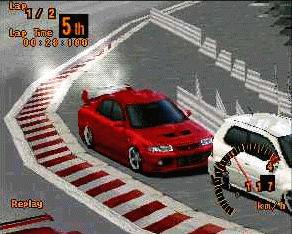 To
To
race this fine repertoire of worldwide-engineered beauties, the number of tracks
has also been increased. Rather than the original’s skimpy 11-track selection,
there are now close to 40. Great care was put into the design of the new
tracks, which are every bit as good as the ones in GT (a few are identical).
My particular favorites are the twisty streets of the Seattle track and the high-speed
intensity of Laguna Seca.
The sheer number of tracks and cars and the large number of races guarantees
that you won’t be putting down this puppy for some time. In case you’re wondering
how you keep track of your progress, there’s a percentage complete check included.
Graphics and sound in GT2, like the game design, aren’t very much changed
since GT. Though the graphics are slightly smoother on the whole, most
gamers won’t be able to notice the difference. This means that you get the same
fantastic rendering of the track and cars. Unfortunately, this also means that
the background objects, such as trees and signs, still look like 2-D cardboard
cutouts. Also, while the car detail is good, it isn’t up to the standards of R4:
Ridge Racer.
On the audio front, we are given the same type of alternative rock to accompany
the race. It’s great at first, with a whole bunch of big-name bands like Stone
Temple Pilots and Beck. However, it gets old. I would have preferred
simple, high-energy instrumental music to the noxious effect of listening to Garbage’s
“Paranoid” for the 20th time.
The only major complaint I have is the collision physics of the game. As in
the first game, there are still no crashes. When you come into contact with the
wall or another car, your car stops or slows down, based upon your speed at the
time of the collision. Supposedly there are no crashes because the car manufacturers
feel this will hurt their images, but this is difficult to swallow. Need For
Speed: High Stakes lets you race and crash the Chevy Corvette and the BMW
M3 — cars that are also in GT2. If it was truly impossible to simulate
crashes, then GT2 should at least have included semi-realistic collision
detection. The cars should lose control or fishtail when they hit other objects.
This is a racing simulation, right?
Gran Turismo 2 is a fantastic game and a no-brainer purchase for fans
of the original as well as any videogame racing fans. The enormous number of tracks
and cars on top of the realistic Gran Turismo gameplay gives this game
some of the best replay value there is. Just remember to keep a stash of CDs on
hand, unless you consider the Foo Fighters‘ “My Hero” to be good driving
music, over and over again.
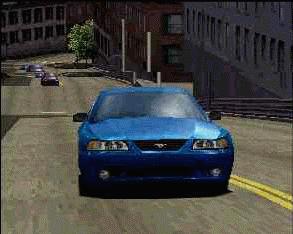
-
Same great game design as the original
-
An amazing number of cars - over 500!
-
Almost 40 Tracks!
-
Still the most realistic racer in the console market
-
Nothing much added
-
Still no crashes, collision physics are all screwed up
